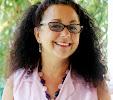Should I not be I, but us?
Talking in an interview about his awakening to the power of the present, Eckhart Tolle explains that what stopped him as a young man from
succumbing to his suicidal thoughts one agonizing night was recognizing as he
was thinking, “I can’t stand to live with myself anymore,” that there must
be two of him. “Who is I who can’t stand to live with Self?” he asked. This
epiphany was the catalyst that initiated his journey to become one of the
world’s foremost spiritual teachers, to my delight, one who intentionally
disaffiliates from formal religions.
My interest in Tolle’s teachings began in early May when I
borrowed the audio book, A New Earth. At the end of April, before I encountered his teachings, I
posted about my little big dream that posed the question, “Can the ego be
dissolved, what is the role of the observer?” and shared with you my own power of Now mini
epiphany. http://litadreaming.blogspot.com/2012/04/observer-or-observed.html
The serendipity of finding his teachings on ego/observer
right after writing about the same subject confirms for me the importance of this material,
as they say, when the student is ready, the teacher appears. I’m sharing the
story with you because it also makes the organic process of dream spirituality
pretty obvious. A dream from 11
years ago (Hey, Trish, I found my eleven!) seeds this profound spiritual koan
in my heart and gradually, with the help of one sign post after another, leads
me to this great, new to me, teacher who can deepen my understanding of the question.
Dreams are organic spirituality; all it takes is listening,
paying attention and braving up to the difficulties they may present, as well
as, recognizing the gifts they bring.
Writing them down ensures that you’ll have them eleven years later or
when you can really appreciate them.
Dreams are way ahead of us.
I began by asking a question about our use of the personal
pronoun, should it be singular or plural? Well “we” is the royal personal
pronoun, isn’t it?
There are many theories of personality proposing that we’re
actually multi-selves, whether we talk about complexes, sub-personalities or lost
soul parts. It can be a little hard
wrapping the logical mind around this; I think of it as psychic string
theory. In many psychological models,
the ego is seen as the captain of the ship, the center of personality that must be in charge to keep us from going crazy. The stronger the ego, the better able
one is to cope with life’s vicissitudes and become successful.
Tolle shakes things up when he proposes that the ego is crazy and letting the ego control
our lives is insane, both on a personal and collective level. The ego is shortsighted and easily
deluded; egoic consciousness focuses on the world of form, gets lost in the
past or the future and is thrall to distorting subjective thoughts and
projections. When we switch our
awareness, become the Observer, we live in the reality of the present moment
and can tune in to a larger consciousness than our puny human egoic thinking
can fathom. The observer is the part of us that can see the ego’s self-created
dilemmas and detach, releasing the obsession by seeing it for what it is, what
William Blake termed, mind forged manacles.
The challenge that Tolle lays out isn’t new and sounds pretty
Buddhist to me, but his synthesis of many spiritual teachings into a clear,
contemporary understanding is very helpful.
.
So, can the ego be dissolved? What is the role of the observer?
Shall we sleep on it?
Here’s the link to ET TV where he tells his story.


Great post, lita! I love tolle's work. And what a beautiful way to describe dreams: organic spirituality.
ReplyDeleteThanks, Trish. They certainly feel that way to me.
ReplyDelete